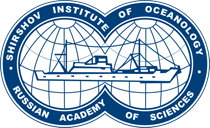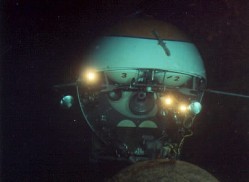MARINE ENGINEERING
Division Head Dr. Alexander Ostrovskiy
1968-1974 Underwater laboratory “Chernomor” for experimenting on longterm (up to 30 days) human presence on the seabed. Southern branch
1987 Deep-sea submersibles Mir were created incorporating 8 technical innovations. Chief designer Dr. Sci. I.E. Mikhaltsev
25 years of Mirs’ successful work at depths up to 6 km
1997-2016 Monitoring (together with the Ministry of Civil Defence and Emergency Response) chemical weapons buried at the bottom of the Baltic Sea after the 2nd World War
Range of small remote controlled vehicles (ROV) – an innovative development
Children categories
Sonar Ocean Bottom Surveying Laboratory
Head: Prof. Nikolay Rimskiy-Korsakov
Department of Hydroacoustics and Instrumental Observations

The main directions of study:
Underwater acoustic and navigating methods design for marine bottom investigations.
Sonar instruments design for bottom search and underwater navigation.
Underwater facilities and hardware-software systems.
Studies of the bottom and submarine objects by sonar methods.
Methods for evaluating the efficiency of marine magnetometric systems using the new Kulbak divergence index (useful signal and interference distributions).
Gradation of efficiency zones with guaranteed values of probability characteristics.
Laboratory of Ocean Acoustics
Head: Dr. Alexander Ostrovskii
Department of Hydroacoustics and Instrumental Observations

The main directions of study:
The theory of the propagation of sound waves in the ocean, taking into account the volumetric inhomogeneities of the aquatic environment, as well as the unevenness of the bottom and the inhomogeneities of the soil.
Continuous acoustic monitoring of water dynamics in the Arctic.
Numerical simulation of sound propagation in the ocean.
Acoustic tomography of the ocean.
Experiments on propagation, scattering and reflection of sound in various hydrological conditions.
Underwater Video Equipment Laboratory
Head: Dr. Boris Rozman
Department of Underwater Robotics, Inhabited Vehicles and Complexes

The main directions of study:
Compact remote operated underwater vehicles (ROVs) for searching, viewing and research tasks.
Implementation of ROVs into oceanographic and ecological practice.
Sonar equipment for ROVs.
Data and telemetry transfer by long cable lines.
Processing of information gathered by ROVs.
Deep Sea Manned Submersibles Laboratory
Head: Hero of Russia Prof. Anatoliy Sagalevich
Department of Underwater Robotics, Inhabited Vehicles and Complexes

The main directions of study:
Integrated scientific research and deep-sea works using manned submersibles.
20 hydrothermal fields of the Atlantic and Pacific Oceans explored from the Mir submersibles.
Design and implementation of deep-sea technology.
Control of compliance with the international safety standards of deep-sea dives, servicing, maintenance and piloting submersibles.
Underwater Engineering and Testing Laboratory
Head: Dr. Konstantin Roginskiy
Department of Underwater Robotics, Inhabited Vehicles and Complexes

The main directions of study:
Testing equipment, instrumentation, units and components of subsea systems.
Technical means for hydrocarbon offshore exploration.
Development of diving techniques, including deep sea methods.
Hydroacoustic instruments, ROVs and manned submersibles.
Diving support for underwater tests.
Professional training for divers.




